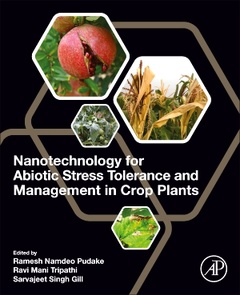Nanotechnology for Abiotic Stress Tolerance and Management in Crop Plants
Coordonnateurs : Pudake Ramesh Namdeo, Tripathi Ravi Mani, Gill Sarvajeet Singh

Nanotechnology for Abiotic Stress Tolerance and Management in Crop Plants reviews the most recent literature on the role of nanomaterials in achieving sustainability in crop production in stressful environments. The book explores the adverse conditions caused by abiotic stress to crop plants and the methods by which these conditions can be potentially overcome through developments in nanoscience and nanotechnology. Abiotic stresses such as drought, salinity, temperature stress, excessive water, heavy metal stress, and UV stress are major factors which may adversely affect the growth, development, and yield of crops. While recent research for ways of overcoming the physiological and biochemical changes brought on by these stresses has focused on genetic engineering of plants, additional research continues into alternative strategies to develop stress tolerant crops, including the use of nanoscience and nanotechnology.
1. Status of impact of abiotic stress on global agriculture 2. Molecular mechanism of abiotic stress regulation in crop plants 3. Introduction to fundamentals of nanoparticle synthesis, characterization, and properties 4. Role of nanotechnology in crop management 5. Molecular mechanism of nanomaterial interaction with plants 6. Role of nanoparticles to protect plant from abiotic stress by scavenging reactive oxygen species 7. Recent advances in field of plant nano nutrition 8. Nanosensors for monitoring soil parameters related to abiotic stress in plants 9. Recent advances in abiotic stress detection with help of plant wearable sensors 10. Monitoring plant health with in-planta nanosensors 11. Status and opportunities of visible detection of heavy metal ions in irrigation water using nanomaterials 12. Nanobiotechnology in genetic engineering for abiotic stress resistance in crops 13. Effect of engineered nano materials on the crop growth parameters under drought stress 14. Applications of bio-based nanomaterials in alleviation of plant abiotic stress 15. Nanozymes mediated enhancement in resistance to abiotic stress in crops 16. Genetic and physiological mechanism of nano particle-based plant growth promotion 17. Seed priming with engineered nanomaterials for mitigating abiotic stress in plants 18. Boosting of stress tolerance in crop plants with the help of bio fertilizer and nano materials 19. IOTs: Internet of Things systems for smart plant health monitoring under abiotic stresses 20. Development of stimuli-responsive nano-based formulations as an opportunity for crop stress management
Dr Ravi Mani Tripathi is an Associate Professor at Amity Institute of Nanotechnology, Amity University Uttar Pradesh, Noida, India. He received his Ph.D. in Nanobiotechnology from Jiwaji University, Gwalior, India. He did his post-doctoral research at School of Pharmacy, Sungkyunkwan University, South Korea, and received the young scientist award in 2019 from the International Scientist award on Engineering, Science, and Medicine, Visakhapatnam, India. He has 15 years of teaching and research experience in Nanobiotechnology. He developed an innovative method for the biological synthesis of nanomaterials like particles, nanodots, flowers, rods, fibres, etc. and has vast expertise in the fields of antimicrobial nanomedicine, colorimetric detection, and catalytic/photocatalytic degradation of toxic pollutants.
Dr. Sarvajeet Singh Gill is an Assistant Professor at Centre for Biotechnology, Maharshi Dayanand University, Rohtak. His research focus includes Agricultural Plant Biotechnology; Biotic & Abiotic stress biology, plant microbe interaction and in-silico understanding of plant genomes.
In addition to his research and teaching responsibilities he has served as Associate Editor for the Brazilian Journal of Botany, and as Guest Editor of Plant Genes. He was Guest Editor of BioMed Research International’s Special Issue (Plant Stress & Biotechnology); Frontiers in Plant Science, Section-Environmental Toxicology (Topic Title: P
- Presents advancements in our understanding of molecular and physiological interactions between nanoparticles and crop plants
- Includes figures and illustrations to help readers visualize and easily understand the role of nanomaterials
- Serves as an ideal reference for those studying smart nanomaterials, biosensors, and nanodevices for real-time plant stress measurement
Date de parution : 03-2024
Ouvrage de 370 p.
19x23.4 cm



